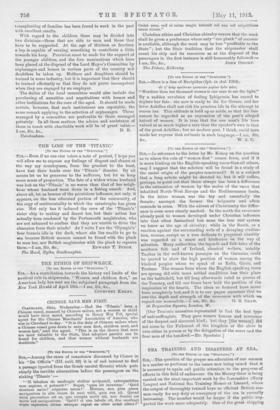[To TEE EDITOR OP THE "SPECTATOR;'] SIR,—In reference to the
letter by Mr. Kenny on the question as to where the rule of " women first" comes from, and if it is more binding on the English-speaking races than all others. may I suggest that the solution will be found in a study of the racial origin of the peoples concerned ? It is a subject that a long article might be devoted to, but it will suffice, perhaps, to point out that there always has been a difference in the estimation of women by the males of the races that inhabited North-West Europe and the Mediterranean basin. In the latter woman was the toy and essentially the female; amongst the former the helpmate and often comrade in arms. With the advent of Christianity the differ- ence is even more clearly marked. In the north the reverence already paid to women developed under Christian influence into that often fantastical but none the less real system we know as the age of chivalry; while in the South, as a reaction against the surrounding evils of a decaying civilize, tion, woman, except as a nun dedicate to perpetual chastity Was regarded as a snare and hindrance on the way of salvation. Many authorities, the legends and folk-tales of the northern folk and of Ireland, classical writers, notably Tacitus in the well-known passages on the Germans, could be quoted to show the high position of woman among the kindred peoples whom we speak of as Kelts, Gauls, and Teutons. The women from whom the English-speaking races are sprung did with more settled conditions lose their place on the battlefield, but till long afterwards ruled as queens of the Tourney, and till our times have held the position of the inspiration of the hearth. The ideas so fostered have never been completely lost, and it is to our pagan ancestors that we owe the depth and strength of the reverence with which we regard our womenfolk—I am, Sir, &a. G. S. SHAW, 36 Bryanston Square, London, W.
[Our Teutonic ancestors represented in fact the best type of anti-suffragists. They gave women honour and reverence of the deepest and sincerest kind ; but they [the women] did not come to the Folkmoot of the kingdom or the shire to vote either in person or by the delegation of the reeve and the four men of the hundred.--ED. Spectator.]










































 Previous page
Previous page